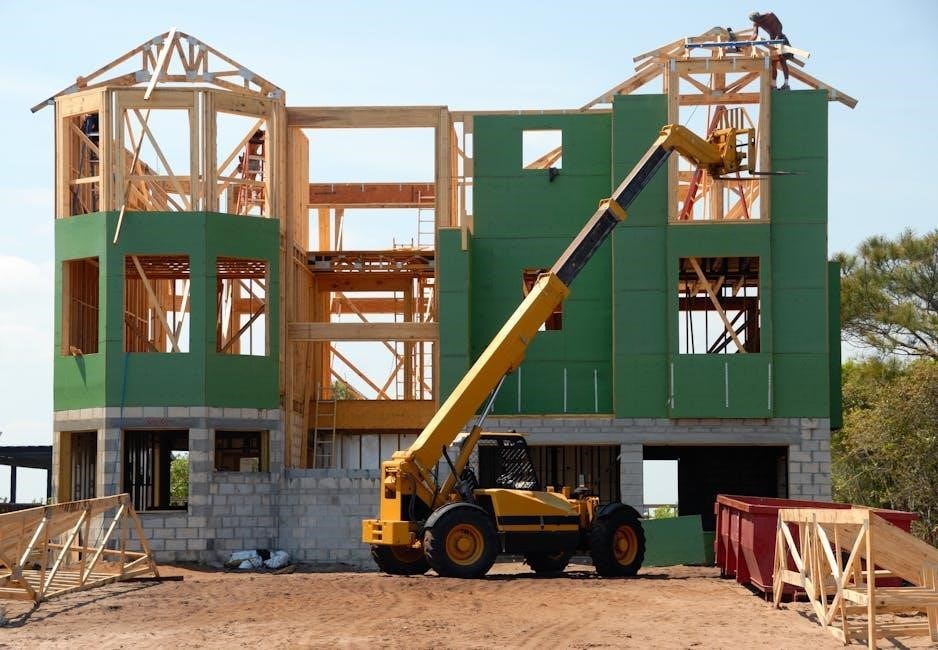Welcome to the world of real estate investing! This guide serves as your gateway to understanding the fundamentals‚ strategies‚ and opportunities in property investment. Discover how real estate can be a powerful tool for building wealth through rental income‚ appreciation‚ and strategic renovations. Learn about the diverse types of properties‚ market trends‚ and legal considerations to make informed decisions. Whether you’re a seasoned investor or just starting out‚ this comprehensive resource will help you navigate the complexities of real estate investing with confidence and clarity.
Basics of Real Estate Investing
Real estate investing involves acquiring properties to generate income through rentals or sales. It requires understanding market dynamics‚ property valuation‚ and financial planning. Investors must assess risks‚ returns‚ and legal obligations. Starting with preapproval letters ensures financial readiness. Diversifying portfolios with residential‚ commercial‚ or industrial properties can optimize returns. Staying informed about regional trends and regulations is crucial for success in this lucrative yet complex field.
Types of Properties for Investment
Real estate investments encompass various property types‚ each offering unique opportunities. Residential properties‚ such as single-family homes or apartments‚ provide steady rental income. Commercial properties‚ including office buildings or retail spaces‚ often yield higher returns. Industrial properties‚ like warehouses‚ cater to businesses. Each type requires a tailored approach‚ and understanding their potential helps investors align choices with financial goals and market conditions.

Understanding Real Estate Market Trends
Real estate market trends are shaped by economic conditions‚ demographic shifts‚ and policy changes. Analyzing these factors helps investors make informed decisions and optimize returns over time.
Current Market Analysis and Insights
The real estate market in 2025 shows steady growth‚ with a 7% annual price increase in key regions. Urban areas like Singapore and Moscow are experiencing high demand for residential and commercial properties. Experts highlight inflation and interest rate fluctuations as key influencers. Regional variations exist‚ with Asia-Pacific markets outperforming others. Sustainability trends are gaining traction‚ with green buildings in high demand. Investors are advised to focus on long-term stability and diversification to maximize returns.
Regional and Global Market Trends
Global real estate markets are experiencing varied growth‚ with Asia-Pacific leading in investment volumes. Singapore and Moscow are hotspots for residential and commercial properties. Europe and North America show stabilization‚ while emerging markets in Africa and the Middle East gain traction due to urbanization. Sustainability remains a global priority‚ with green building certifications in high demand. Regional trends highlight differing recovery paces‚ influenced by local policies and economic conditions‚ offering diverse opportunities for investors.

Legal and Regulatory Considerations
Understanding real estate laws is crucial for compliance and risk mitigation. Property registration systems‚ national regulations‚ and international standards ensure secure transactions. Expert legal guidance helps navigate complexities.
Real Estate Laws and Registration Systems
Real estate laws and registration systems vary by country‚ ensuring property transactions are secure and legally binding. In Singapore‚ expats must comply with specific regulations‚ while Russia requires adherence to local property laws. Understanding these systems is essential for avoiding legal penalties and ensuring smooth transactions. Proper registration of deeds and titles is crucial‚ protecting both buyers and sellers. Legal experts recommend thorough due diligence to navigate complex requirements effectively.
National and International Regulations
National and international regulations govern real estate transactions‚ ensuring fairness and transparency. The National Association of Realtors’ Clear Cooperation Policy promotes ethical practices‚ while international laws like those in Singapore and Russia provide frameworks for cross-border investments. These regulations often include steps like title verification‚ legal compliance‚ and anti-money laundering measures. Adhering to these rules is crucial for secure and legitimate property dealings‚ protecting both buyers and sellers in a global market.
Tips for Buying and Selling Properties
When buying or selling properties‚ obtaining a preapproval letter and conducting thorough market research are crucial. Set a realistic budget‚ prioritize location‚ and assess property conditions. For sellers‚ highlight the property’s best features‚ price competitively‚ and showcase a well-staged home to attract potential buyers.
Guides for Home Buyers
For home buyers‚ securing a preapproval letter is essential to demonstrate financial readiness. Conduct thorough market research‚ set a realistic budget‚ and prioritize location and property condition. Work with reputable agents and consider factors like commute times and neighborhood amenities. Inspect properties carefully and negotiate terms wisely. Understanding market trends and legal requirements can help streamline the process. Stay informed to make confident decisions and achieve your homeownership goals successfully.
Strategies for Selling Properties
Effective property selling begins with competitive pricing and a strong online presence. Enhance curb appeal‚ declutter spaces‚ and consider virtual tours to attract buyers. Collaborate with experienced agents to navigate market dynamics. Highlight unique features and ensure legal compliance. Understand buyer preferences and tailor marketing strategies accordingly. Transparent communication and flexible negotiations can expedite the process‚ ensuring a smooth and profitable transaction for sellers.
Financing and Mortgage Options
Explore various mortgage options and financing strategies to secure your real estate investments. Preapproval letters and tailored loan solutions can streamline the purchasing process effectively.
Preapproval Letters and Their Importance
A preapproval letter is crucial in real estate financing‚ confirming your borrowing capacity and strengthening your position as a serious buyer. It outlines the approved loan amount and terms‚ helping you understand your budget and negotiate better deals. In competitive markets‚ a preapproval letter can give you an edge‚ demonstrating financial readiness to sellers and agents. It also streamlines the mortgage process‚ ensuring smoother transactions and faster closings.
Leveraging Loans for Real Estate Investments
Leveraging loans is a key strategy for scaling real estate investments. By using mortgage loans‚ investors can amplify their purchasing power and secure larger properties with minimal upfront capital. Loan options like fixed-rate mortgages or adjustable-rate loans offer flexibility. Strategic use of debt allows investors to maximize returns while managing cash flow. Exploring government-backed loans or private financing can also unlock opportunities. Understanding loan terms and repayment schedules is essential for long-term success in real estate investing.
Property Management and Maintenance
Effective property management involves regular maintenance‚ tenant screening‚ and timely repairs to ensure optimal property value and tenant satisfaction. Proper oversight prevents costly issues and enhances returns.
Best Practices for Managing Properties
Regular inspections and proactive maintenance are essential to prevent costly repairs. Tenant screening ensures reliable renters‚ while clear communication fosters trust. Organized financial tracking and adherence to lease agreements maintain stability. Responsive handling of issues and staying informed about local regulations are crucial. Implementing property management software streamlines tasks‚ ensuring efficiency and maximizing returns. Consistent upkeep and fair tenant relations build long-term value and a positive reputation in real estate investing.
Maintaining Residential‚ Commercial‚ and Industrial Properties
Maintaining properties requires tailored approaches for each type. Residential properties need regular inspections‚ landscaping‚ and tenant relations. Commercial spaces require upkeep of utilities‚ safety standards‚ and common areas. Industrial properties demand specialized equipment maintenance‚ structural checks‚ and compliance with zoning laws. Regular maintenance‚ timely repairs‚ and adherence to safety regulations ensure functionality‚ safety‚ and long-term value across all property types‚ safeguarding investments and user satisfaction.
Tax Implications and Benefits
Understand tax deductions‚ exemptions‚ and incentives for property owners. Leverage benefits like mortgage interest deductions‚ property tax reductions‚ and capital gains exemptions to maximize returns and reduce liabilities.
Maximizing Tax Benefits in Real Estate
Understanding tax strategies is crucial for real estate investors. Deductions on mortgage interest‚ property taxes‚ and operating expenses can significantly reduce taxable income. Capital gains exemptions and depreciation allowances further enhance profitability. Additionally‚ tax-deferred exchanges‚ such as 1031 exchanges‚ allow investors to defer capital gains taxes when reinvesting in similar properties. Consulting with a tax professional ensures compliance and maximizes financial benefits‚ making real estate a tax-efficient investment vehicle.
Understanding Property Taxes and Incentives
Property taxes are annual levies on real estate‚ varying by location and property type. They fund public services like schools and infrastructure. Incentives‚ such as tax breaks for eco-friendly buildings or affordable housing‚ can reduce tax burdens. Some governments offer exemptions or rebates for specific investments. Consulting a tax advisor helps navigate these rules and maximize savings‚ ensuring compliance while benefiting from available incentives tailored to your property type and location.

Renovation and Development
Renovation and development enhance property value and functionality. Strategic upgrades‚ modern designs‚ and sustainable practices attract investors and tenants‚ ensuring long-term profitability and market competitiveness.
Renovation Tips to Increase Property Value
Renovating strategically can significantly boost property value. Focus on modernizing kitchens and bathrooms with high-quality materials. Adding natural light through skylights or larger windows enhances appeal. Landscaping and exterior upgrades create a welcoming first impression. Consider energy-efficient features like solar panels or smart home technology. Plan meticulously‚ balancing costs with potential returns to ensure renovations align with market expectations and attract potential buyers or tenants effectively.
Steps for Successful Real Estate Development
To ensure success in real estate development‚ start with a thorough feasibility study to assess profitability. Select prime locations that align with market demand and growth potential. Secure necessary permits and approvals early in the process. Collaborate with experienced contractors and architects to bring your vision to life. Monitor construction timelines and budgets closely. Finally‚ ensure compliance with local regulations and adapt to market trends to maximize returns on investment.

Regional Real Estate Guides
Explore regional real estate guides for insights into market trends‚ legal requirements‚ and investment opportunities in Asia‚ Europe‚ the Americas‚ and more. Discover local expertise and regulations to make informed decisions for global property investments‚ ensuring success in diverse markets.
Buying Property in Singapore: A Comprehensive Guide
Singapore offers a stable and lucrative real estate market‚ attracting both locals and foreigners. From luxurious condos in the Central Business District to charming landed properties in suburban areas‚ the options are diverse. Foreign buyers benefit from favorable incentives and transparent regulations. Whether you’re an expat or investor‚ this guide provides step-by-step insights into navigating Singapore’s property market‚ ensuring a seamless and informed purchasing experience tailored to your needs and goals.
Investing in Russian Real Estate: Key Insights
Russian real estate offers diverse opportunities‚ from residential apartments in Moscow to commercial properties in emerging cities. Current market trends show steady growth‚ with increasing demand for urban housing and industrial spaces. Foreign investors can navigate the market with proper guidance on local regulations and cultural nuances. This guide provides insights into Russia’s property landscape‚ helping investors make informed decisions and capitalize on the country’s real estate potential effectively.
Future Outlook and Emerging Trends
Real estate is evolving rapidly‚ with AI technology transforming how properties are bought‚ sold‚ and managed. Sustainability and green building trends are gaining momentum‚ reshaping the industry’s future.
AI Technology in Real Estate
AI technology is revolutionizing the real estate industry by streamlining processes and enhancing decision-making. From predictive analytics to virtual property tours‚ AI tools enable buyers and investors to make data-driven choices. Machine learning algorithms analyze market trends‚ while chatbots assist with inquiries‚ improving efficiency and customer experience. AI-driven platforms also optimize property valuations and match buyers with ideal properties‚ making real estate transactions faster and more personalized than ever before.
Sustainability and Green Building Trends
Sustainability is reshaping the real estate landscape‚ with green building practices gaining momentum. Energy-efficient designs‚ LEED certifications‚ and smart home technology are becoming priorities. Developers are incorporating renewable materials and solar panels to reduce environmental impact. Buyers increasingly value eco-friendly properties‚ driving demand for sustainable living spaces. This trend not only benefits the environment but also offers long-term cost savings and potential tax incentives‚ making green buildings a smart investment choice.
